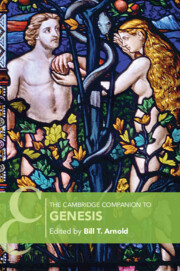Book contents
- The Cambridge Companion to Genesis
- Cambridge Companions to Religion
- The Cambridge Companion to Genesis
- Copyright page
- Contents
- Abbreviations
- Contributors
- 1 Introduction: Genesis and the status quaestionis
- Part I Composition and Structure of Genesis
- 2 Genesis in the History of Critical Scholarship
- 3 Genesis in Source and Redaction Criticism Today
- 4 Genesis in Form and Tradition Criticism Today
- 5 Rhetorical Features and Characteristics:
- Part II Social World of Genesis
- Part III Themes and Literary Motifs of Genesis
- Part IV Reception History of Genesis
- Scripture Index
- Subject Index
- Cambridge Companions to Religion (continued from page iii)
- References
2 - Genesis in the History of Critical Scholarship
from Part I - Composition and Structure of Genesis
Published online by Cambridge University Press: 02 June 2022
- The Cambridge Companion to Genesis
- Cambridge Companions to Religion
- The Cambridge Companion to Genesis
- Copyright page
- Contents
- Abbreviations
- Contributors
- 1 Introduction: Genesis and the status quaestionis
- Part I Composition and Structure of Genesis
- 2 Genesis in the History of Critical Scholarship
- 3 Genesis in Source and Redaction Criticism Today
- 4 Genesis in Form and Tradition Criticism Today
- 5 Rhetorical Features and Characteristics:
- Part II Social World of Genesis
- Part III Themes and Literary Motifs of Genesis
- Part IV Reception History of Genesis
- Scripture Index
- Subject Index
- Cambridge Companions to Religion (continued from page iii)
- References
Summary
“The Torah speaks a human language” – the saying, accredited to Rabbi Ishmael (90–135 CE) and found in the Midrashic treatise Sifre to Numbers 112, is at the root of a critical reading of the Scriptures. It underscores that Scriptures, considered divine revelation, are formulated in a language that follows the rules of any language and the conventions of human communication. R. Ishmael had his opponents, obviously, who belonged to the school of Rabbi Aqiba (40–137 CE) and affirmed that every detail in the Scripture is divinely inspired and therefore meaningful, a tendency for which recent scholarship coined the term “omnisignificance.”1 On the one hand, the school of R. Ishmael thinks of the Bible as having divine origin, but also as being a book like many other books and, on the other hand, R. Aqiba affirms the uniqueness of the Bible and detects a deeper, theological, meaning in every peculiarity of the biblical text.2 For R. Ishmael’s disciples, we may perceive errors, inconsistencies, differences, and imperfections in Holy Scriptures as in other human work.
- Type
- Chapter
- Information
- The Cambridge Companion to Genesis , pp. 11 - 52Publisher: Cambridge University PressPrint publication year: 2022

